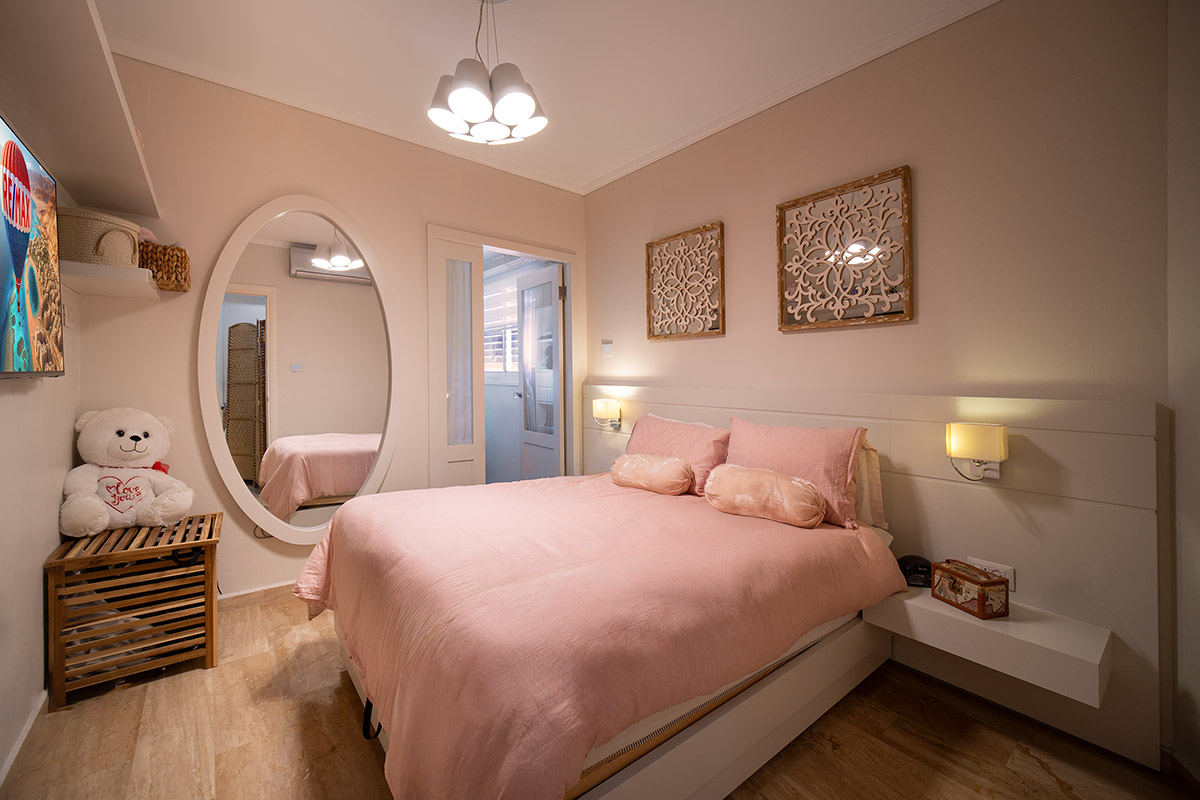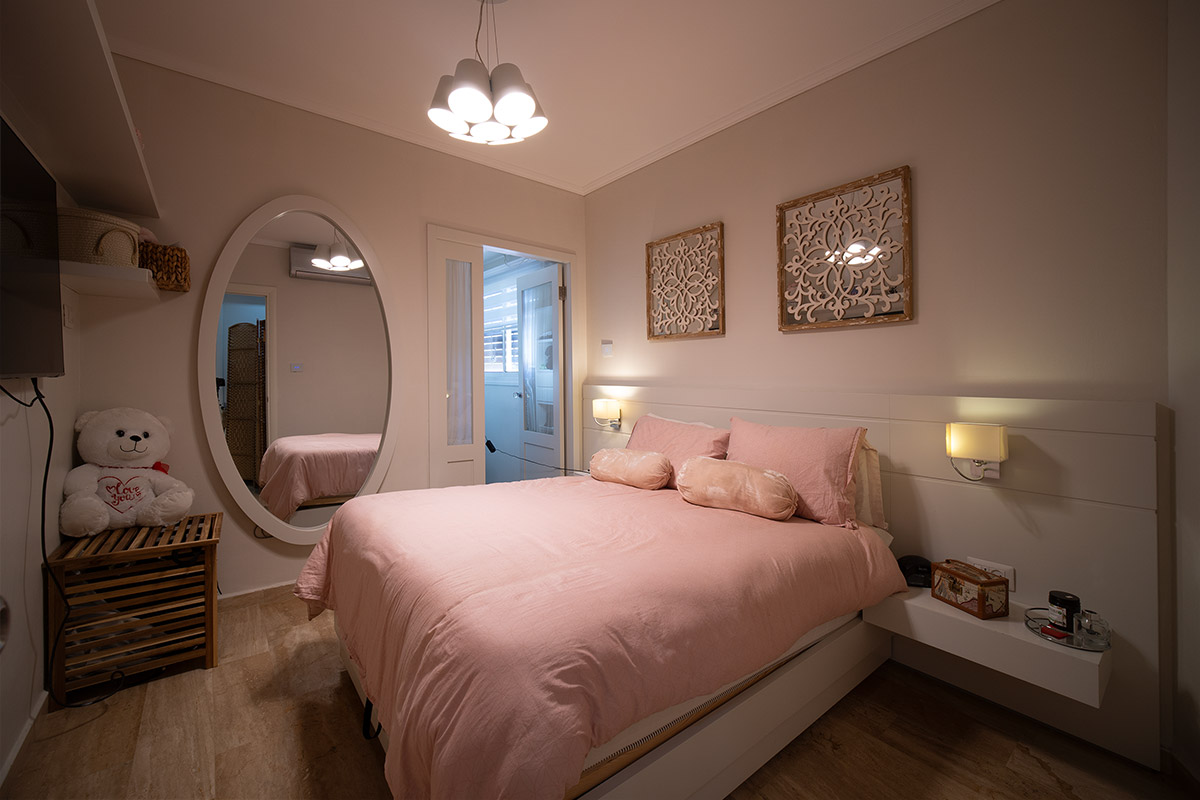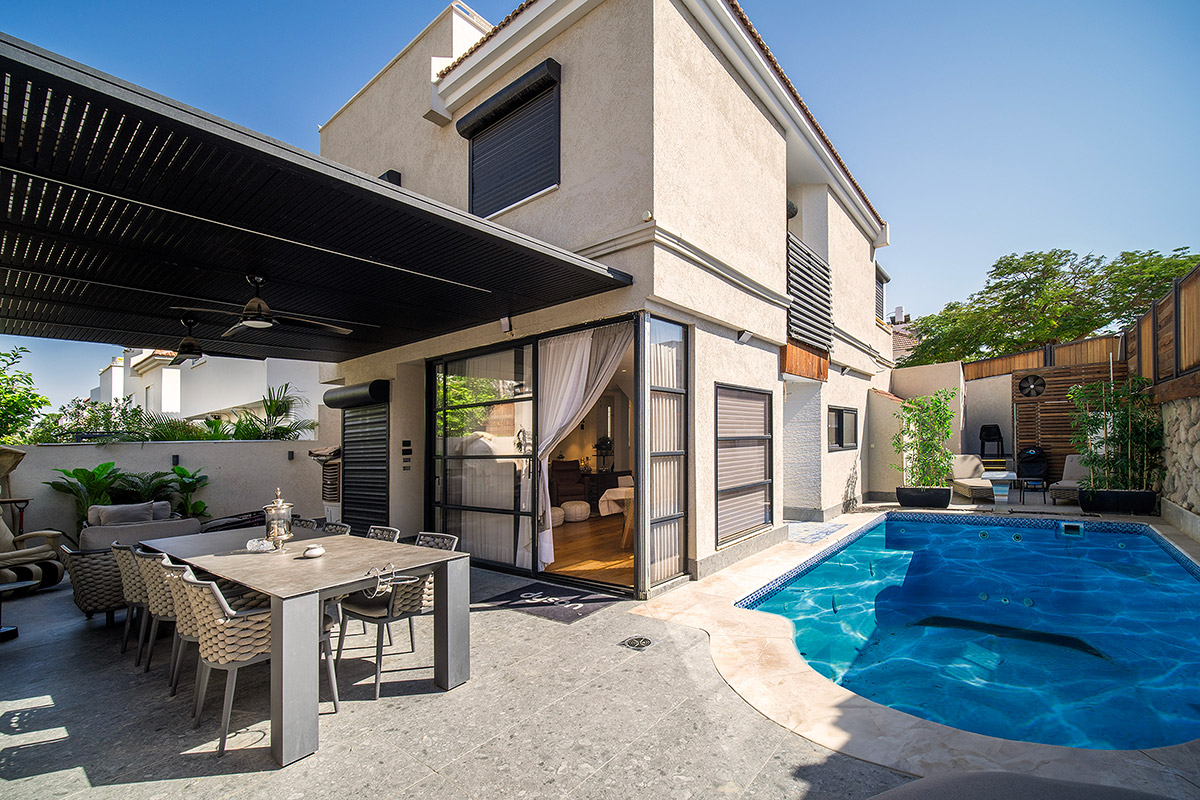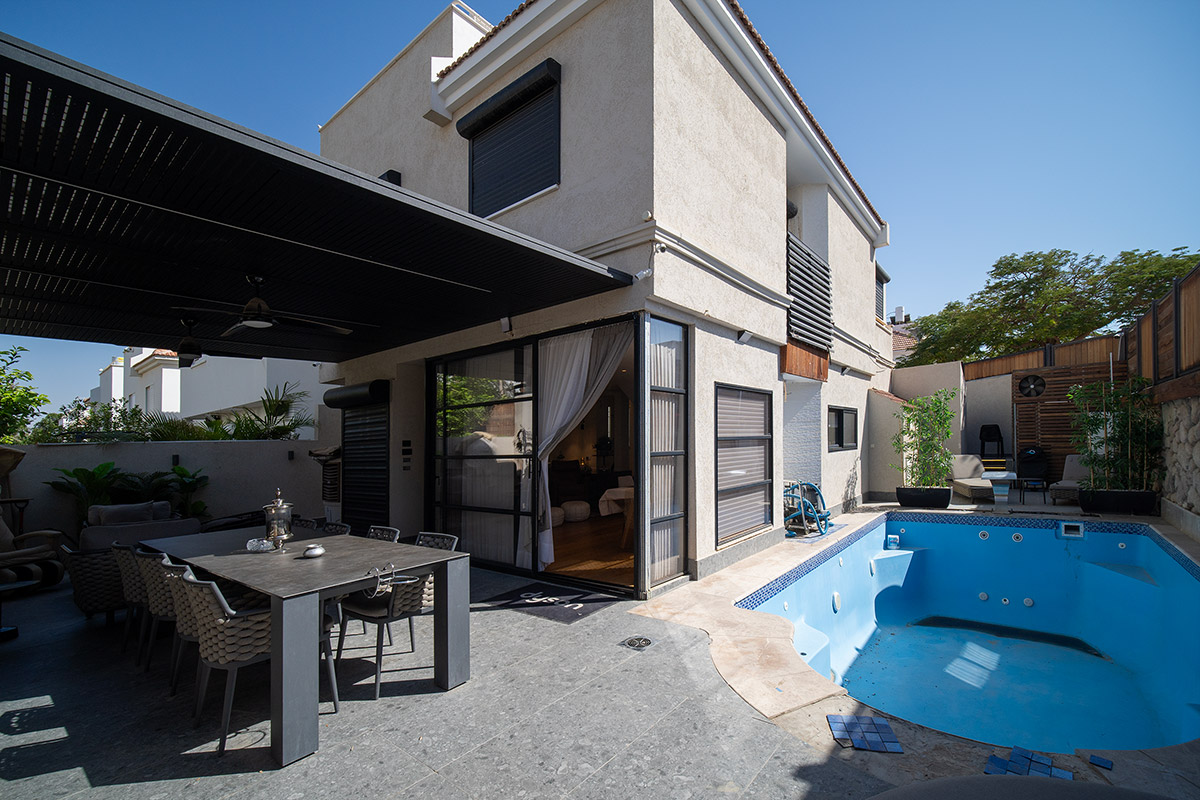INTERIOR
The fact that lines should be straight during the shoot itself (thanks to a professional tripod and built-in level), that windows shouldn't be overexposed but reveal a view of the surroundings (especially if this is an important advantage of the property), and that the white balance should correspond to the real colors – all this goes without saying and should be present by default in any professional shoot.
Let's dive into the often-overlooked nuances of real estate photography that can make or break a viewer's opinion, reflecting positively on both the property and the realtor's expertise.
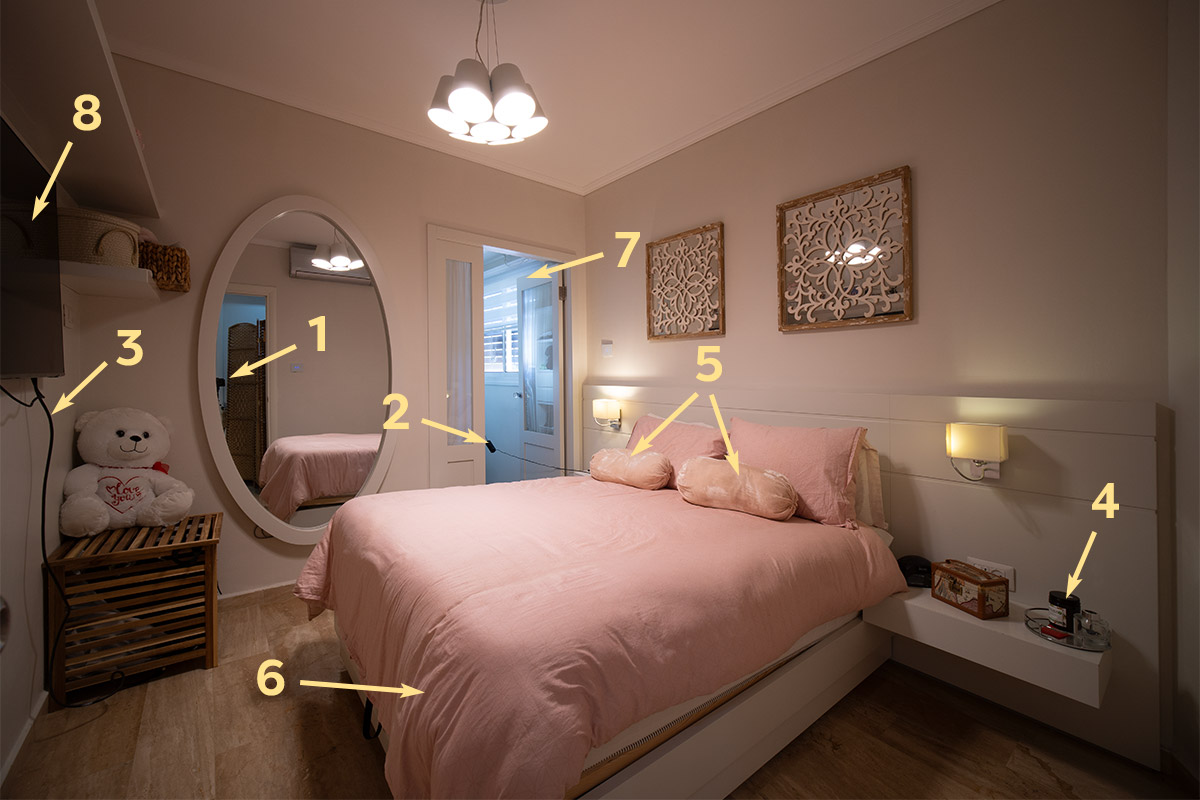
1. Reflection of a camera in the mirror
The presence of a camera or photographer's reflection in
a real estate image is considered unprofessional because it can
distract potential buyers from the property itself. It breaks the
immersive experience, reminding viewers that they are looking at a
photograph rather than allowing them to envision themselves in the
space.
2. Lighting fixture cable
To maximize the appeal of a real estate image, it's
important to ensure lighting setups and other photographic equipment
remain out of the frame.
3. Messy wires from household appliances
The jumble of wires can create a sense of clutter and
disorganization in the room. It's important to either tidy up
the cables before taking the photo or remove them in post-production
to ensure the space looks neat and appealing to potential buyers or
renters.
4. Unnecessary objects in the shot and personal
belongings
Having a tidy, depersonalized space is key in real estate
imagery because it allows potential buyers to imagine their own
stuff in the home. Removing extraneous items helps to emphasize the
available space and features of the property, rather than the
current occupant's lifestyle.
5. Optical illusion: the pillows on the bed appear to be
shifted to the left
The pillows rested perfectly, but from this angle, the
alignment of the pillows on the bed seems off-center. This
perspective illusion creates an inaccurate impression of the
room's symmetry and design. Rearranging the pillows to appear
more centered would provide a more balanced and harmonious visual
representation of the space.
6. Wrinkles in the blanket
Extra folds in the blanket can make the bed look unkempt,
suggesting a lack of attention to detail. A smooth, crisp blanket
creates a more aesthetically pleasing appearance and conveys a sense
of care and precision in the property's maintenance.
7. Differences in color temperature between various light
sources
Variations in light warmth in a room can create an
inconsistent and visually unappealing lighting environment.
It's important to adjust these differences in post-production
to ensure the space is presented in a harmonious and attractive
manner.
8. Using the TV screen to promote the real estate agency's
brand
Incorporating a branded image of a real estate agency on the
TV screen can serve as a subtle marketing touch, effectively
personalizing the space while promoting the agency's brand.
This approach can enhance brand recognition and create a memorable
visual connection between the property and the agency representing
it.
EXTERIOR
Different opinions exist on the subject of real estate photography. Some believe that photos should be as documentary as possible, showing everything as it is, including any flaws that were either forgotten or not fixed before the shoot. We, on the other hand, believe that the main purpose of real estate photography is to reveal the full potential of the property and create a desired image of their future home in the mind of the potential buyer or tenant.
At the same time, it is unacceptable, for example, to show a view of the sea from the window if there is none. But if, as in this case, the pool was not filled with water at the time of the shooting, then this can and should be corrected. In this sense, our photos are closer to virtual home staging, but within the framework of the existing interior and exterior items. Rather, it is more about "virtual tidying up." However, we also do full-fledged virtual home staging, which you can read about here.
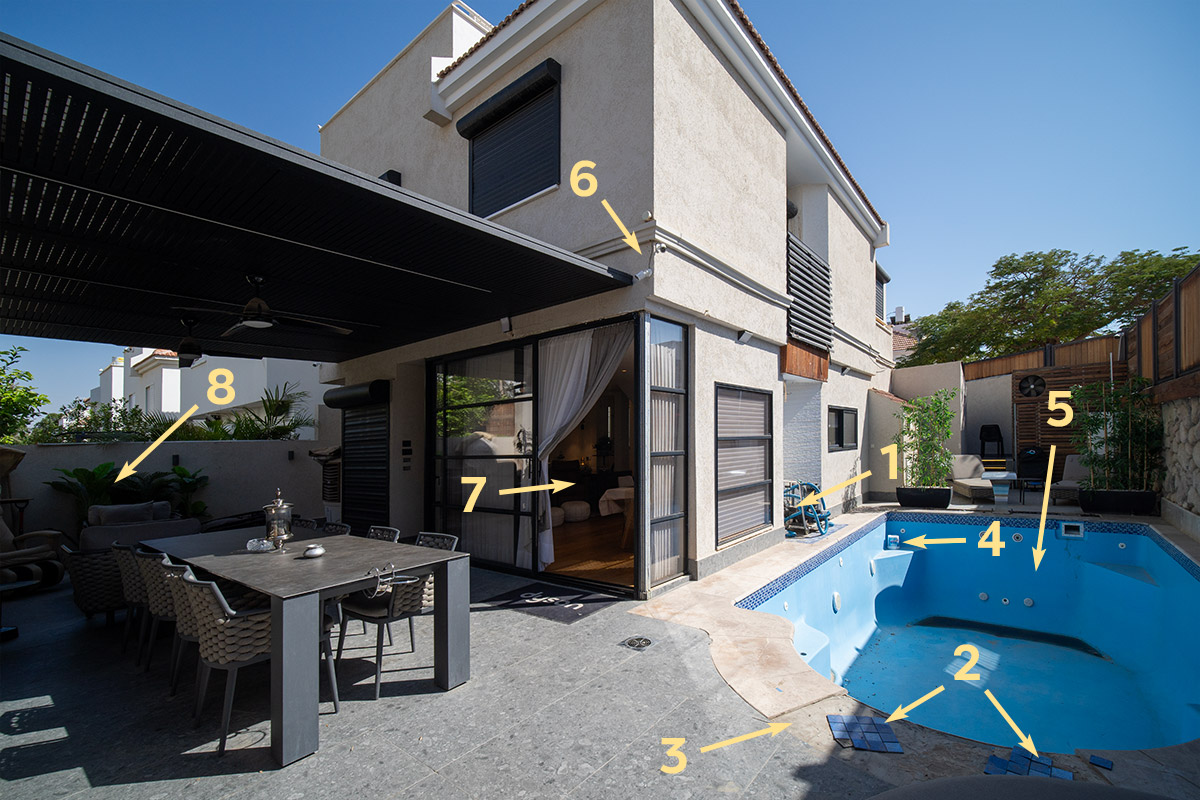
1. Visual noise
Visual clutter, such as the presence of various unnecessary
objects in a patio area, can detract from the main features of the
space. It's important to remove such items to create a clean,
spacious environment that allows potential buyers to focus on the
key selling points of the outdoor area.
2. Remnants of construction and finishing supplies lying
around
The presence of construction and finishing materials such as
the tiles and grout can give the impression that the property is
still under maintenance or renovation. This could be misleading or
off-putting to potential buyers, who might prefer to see a finished
and ready-to-move-in environment.
3. Gaps in marble tiling
Missing marble tiles on the pool could suggest incomplete
work or disrepair. Replacing the missing tiles and presenting a
fully finished surface would contribute to a more polished and
well-maintained appearance of the property.
4. Bucket of construction mix
A forgotten bucket inside the pool detracts from the outdoor
area's aesthetic, signaling ongoing work. Removing such items
would ensure the focus remains on the property's features and
recreational potential.
5. Empty pool
The lack of water in the pool draws attention to maintenance
issues rather than the luxury or enjoyment a pool typically offers.
Filling the pool with water would greatly improve the
property's visual appeal and highlight this key feature to
potential buyers.
6. Removal of security cameras
By minimizing the visibility of surveillance cameras in real
estate photos, the property can be presented as more inviting, while
also addressing security by not advertising the presence and
location of cameras. This approach helps maintain privacy and
security protocols, and keeps the focus on the property's
aesthetics.
7. Interplay between inside and outside
Demonstrating the connection between the interior and
exterior can significantly enhance the appeal of a property by
showing the flow of living spaces. Opening curtains or doors to
create a visual link can suggest a seamless transition, promoting an
indoor-outdoor lifestyle that many buyers find attractive.
8. Exposure adjustment
The shaded area under the canopy is quite dark, making it
difficult to see the features in that space. Enhancing the
visibility of this area in post-production can reveal the comfort
and potential of this inviting outdoor living space, adding value to
the property's overall presentation.

